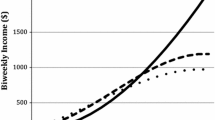Abstract
A multidimensional view of the impact of higher education is presented. The influence of earnings on three other life outcomes is considered. Data from a follow-up of students in the United States who had earlier participated in the Freshmen Norms Survey of the Cooperative Institutional Research Program (CIRP) indicate the distinctiveness of selected outcomes. A different developmental process is suggested for each. Controlling for other inputs, we found possible impacts of higher education on earnings attainment and liberalism-conservatism, but not on later job and life satisfaction.
Similar content being viewed by others
References
Alwin, D. (1976). “Socioeconomic background, colleges, and post-collegiate achievements,” in W. Sewell, R. Hauser and D. Featherman (eds.), Schooling and Achievement in American Society. New York: Academic Press, pp. 343–372.
Angle, J. and Wissmann, D. (1981). “Gender, college major and earnings,” Sociology of Education 54: 25–33.
Astin, A. (1977). Four Critical Years. San Francisco: Jossey-Bass.
Beaton, A. (1975). “The influence of education and ability on salary and attitudes,” in F. Juster (ed.), Education, Income and Human Behavior. New York: McGraw-Hill, pp. 365–396.
Bowen, H. (1977). Investment in Learning. San Francisco: Jossey-Bass.
Bowles, S. and Gintis, H. (1976). Schooling in Capitalist America. New York: Basic Books.
Davis, J., Smith, T. and Stephenson, C. (1978). General Social Surveys. 1972–1978: Cumulative Codebook. Chicago: National Opinion Research Center.
Dwyer, J. (1983). Statistical Models for the Social and Behavioral Sciences. New York: Oxford Press.
Easterlin, R. (1974). “Does economic growth improve the human lot?” in P. David and M. Reder (eds.), Nations and Households in Economic Growth. New York: Academic Press.
Feldman, K. and Newcomb, T. (1969). The Impact of College on Students. San Francisco: Jossey-Bass.
Foster, E. and Rodgers, J. (1979). “Quality of education and student earnings,” Higher Education 8: 21–37.
Griffin, L. and Alexander, K. (1978). “Schooling and socio-economic attainments: High school and college influences,” American Journal of Sociology 84: 319–347.
Hearn, J. and Olzak, S. (1981). “The role of college major departments in the reproduction of sexual inequality,” Sociology of Education 54: 195–205.
Heath, D. (1977). “Academic predictors of adult maturity and competence,” Journal of Higher Education 48: 613–632.
Hoyt, D. (1966). “College grades and adult accomplishment: A review of research,” Educational Record 47: 70–75.
Jencks, C. (1972). Inequality. New York: Basic Books.
Maslow, A. (1968). Toward a Psychology of Being. New York: Van Nostrand.
Ochsner, N. and Solmon, L. (1979). College Education and Employment. The Recent Graduate. Bethlehem: CPC Foundation.
Riley, S. (1982). “The applicability of undergraduate education in jobs,” Higher Education 11: 155–175.
Scitovsky, T. (1977). The Joyless Economy. New York: Oxford.
Selvin, H. and Hagstrom, W. (1960). “Determinants of support for civil liberties,” British Journal of Sociology 11: 51–73.
Solmon, L. (1981). “New findings on the links between college education and work,” Higher Education 10: 615–648.
Solmon, L. and Wachtel, P. (1975). “The effects on income of type of college attended,” Sociology of Education 48: 75–90.
Spaeth, J. and Greeley, A. (1970). Recent Alumni and Higher Education. New York: McGraw-Hill.
Spaulding, C. and Turner, H. (1968). “Political orientation and field of specialization among college professors,” Sociology of Education 41: 247–281.
Weisbrod, B. and Karpoff, P. (1968). “Monetary returns to college education, student ability, and college quality,” Review of Economics and Statistics 50: 491–497.
Withey, S. (1971). “Some effects on life style,” in S. Withey (ed.), A Degree and What Else? New York: McGraw-Hill, pp. 81–94.
Author information
Authors and Affiliations
Rights and permissions
About this article
Cite this article
Phelan, T.J., Phelan, J.C. Higher education and early life outcomes. High Educ 12, 665–680 (1983). https://doi.org/10.1007/BF00132423
Issue Date:
DOI: https://doi.org/10.1007/BF00132423




